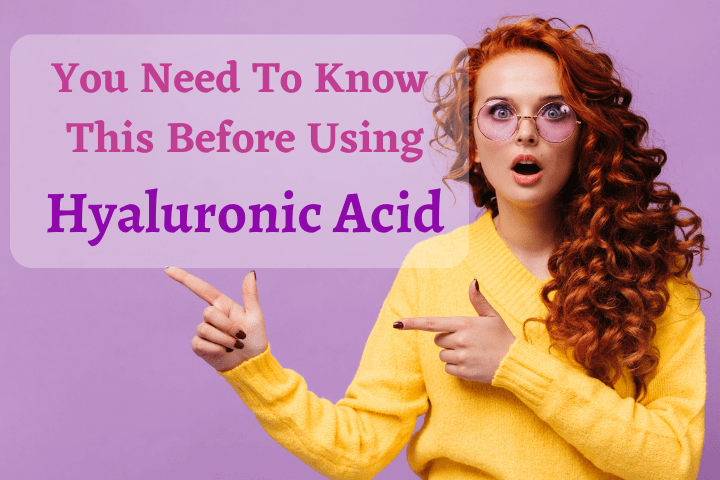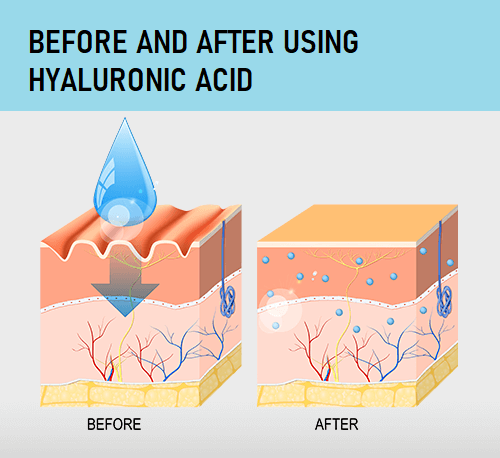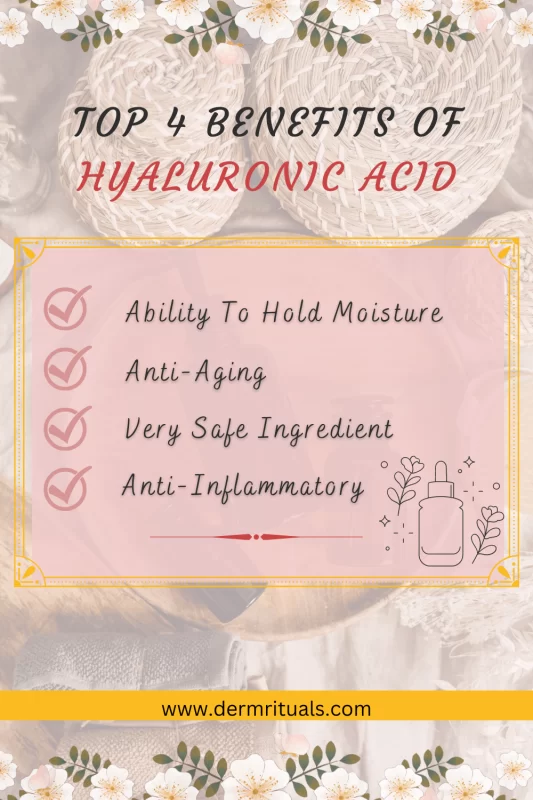Hyaluronic Acid: You Need To Know This Before Using

What Is Hyaluronic Acid?
Hyaluronic acid is naturally found in our body, especially in the joints and skin. It is also known as HA and is becoming the most popular ingredient in our skincare and cosmetic products. Hyaluronic Acid (HA) is a naturally-derived ingredient.
Hyaluronic acid is not really an ACID but it is more of a sugar. It is a gooey substance that we have in our joints and skin.
It’s important to know where it all starts! HA is most commonly derived from a plant fermentation process and is rarely derived from animals. Sodium hyaluronate (SH) is also a form of HA that is extracted from HA. Sodium hyaluronate is more easily absorbed by the skin than HA.
It is important because it is one of the top 3 building blocks of the second layer of our skin (dermis). This layer of our skin contains natural collagen, elastin, and hyaluronic acid, along with other compounds. The health of the dermis is responsible for the aging of our skin i.e. wrinkles and fine lines.
Why Do We Apply Hyaluronic Acid:

What happens is that as our skin ages over time the production of the skin’s natural hyaluronic acid is reduced. Thus, we see less glow on our skin and the skin starts to show signs of dehydration in form of wrinkles and fine lines. This is why it is very helpful to apply hyaluronic acid topically to our skin to help rejuvenate our skin and reverse the signs of aging.
In short HA (hyaluronic acid) is known as dry skin, wrinkle-plumping savior ingredient.
There are three main types of formulations of hyaluronic acid. They are hyaluronic acid creams, hyaluronic acid serums, and hyaluronic acid injections. I am covering the topic of hyaluronic acid creams and serums today.
Things You Need To Know About Hyaluronic Acid (HA):
Hyaluronic Acid Is A Humectant:
HA is a humectant. Humectants work by pulling water/moisture from the environment in order to hydrate our skin. HA is a natural sugar that is made to moisturize. It is a substance that is really good at holding onto water. In fact, it can hold water up to1000 times of its weight.
Hyaluronic Acid Can Dehydrate Your Skin:
Although hyaluronic acid is known and hyped for its moisturizing properties but this information needs a little bit of clarity. As I mentioned that hyaluronic acid is a humectant, so it does not have its own moisturizing properties. HA needs to be applied on damp skin to get the full benefits. HA also absorbs moisture from the air around you. So if you live in a humid environment then it is best to apply hyaluronic acid for moisturizing.
If HA is applied on dry skin, it can actually soak up the moisture of your skin and dehydrate your skin. Which, in severe cases, can lead to redness and itchiness on the skin. Also if you live in an area where the climate that is dry then you need to apply a layer of moisturizer after applying hyaluronic acid to prevent dehydration. I’ll suggest not using HA in dry weather conditions.
Molecular Weights:
HA has different molecular weights. HA with high molecular weight works on the top layer of our skin and plumps up the wrinkles and fine lines on your skin. It also has anti-inflammatory properties that reduce redness and heal our skin.
Whereas, HA with low molecular weight penetrates deeper into our skin layer to give you that extra glow from within. They provide hydration on the deeper layer of your skin.
As a beginner you should use HA that has a higher molecular weight as HA with low molecular weight can cause a little irritation to some skin types.
Sometimes Derived From Wheat:
Plant-based HA is usually derived through a fermentation process and then it is processed to the desired molecular size. Sometimes it is derived from wheat sources so people with wheat intolerance or celiac disease may want to check that out first.
Benefits of Hyaluronic Acid:

These are some reasons why you need to make hyaluronic acid a part of your skincare game.
1- Ability To Hold Moisture:
Hyaluronic acid has the ability to hold moisture up to a thousand times of its weight. This is a lot if you imagine a pea multiplied by 1000. This is what makes hyaluronic acid so unique.
2- Anti-Aging:
The moisture-holding properties of HA make it great to hydrate your skin. When applied regularly, HA can plump up the wrinkles and fine lines on your skin. Thus, leaving you with youthful skin and reverse the signs of skin-aging.
3- Very Safe Ingredient:
HA is the safest skincare ingredient to use under any skin condition. It can be used daily. This is why it is found in almost every cosmetic and skincare product on the market. There are very few skin conditions in which HA has a side effect.
4- Anti-Inflammatory:
High molecular hyaluronic acid can heal our skin in case of any inflammation and reduce redness due to its anti-inflammatory properties. It is also great for acne-prone skin and helps the acne heal quicker.
Some Point To Keep In Mind:
Now that you know all about Hyaluronic Acid, let’s learn about how to use it to get the full benefits out of it and what not to do.
1- Apply On Clean, Damp Skin:
This is a very obvious point but still needs to be mentioned. Just like any other skincare product, HA needs to be applied on nice clean skin to get the full benefits. Do not pat dry your skin after cleansing. HA should be applied on damp skin. If you use a toner then apply HA after toning your skin.
2- Moisturize Afterwards:
Hyaluronic acid soaks up moisture from its surroundings. So, to prevent HA sucking up the moisture of your skin, you need to apply a moisturizer after applying hyaluronic acid to lock in the hydration properties.
3- Do Not Use In Dry Weather:
I personally think that using hyaluronic acid when the weather is dry is not going to benefit your skin in any way. It can actually do more harm than good. As it will soak up the natural moisture in your skin and dehydrate your skin even more. So, it is better not to use HA at all in a dry climate.
4- Keep Yourself Hydrated:
Keeping your body hydrated will help to reap the benefits of hyaluronic acid to its full potential. Drinking at least 2 liters of water per day will not only benefit your skin but also help your overall health.
To Conclude:
- Hyaluronic acid is not an acid and not a moisturizer itself.
- It hydrates our skin by absorbing moisture from its environment and other sources near it so applying a topical moisturizer helps to boost hydration in your skin.
- It is great to reverse the signs of aging but only if used correctly
- Low molecular HA is best to provide hydration to deeper layers of our skin but I personally use high molecular HAs and love the results on my skin.
- Let me know in the comments what were your results after using hyaluronic acid and did you use them as I’ve mentioned in this post?


